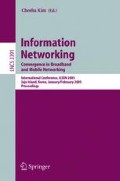Abstract
Packet losses are bursty in nature since the dominant reason is temporary overload situations in the shared resources over networks. To increase the effectiveness of forward error correction (FEC) schemes, adaptive FEC schemes have been suggested, where the amount of redundancy is controlled according to current network status. In this paper, we propose a gap- based adaptive FEC scheme, which is motivated by the Markov gap model for packet losses, and show that the gap-based adaptive FEC scheme performs better than the adaptive FEC scheme based on the Gilbert model.
This work was supported by Grant No. R01-2001-00349 from the Korea Science & Engineering Foundation and the Research Grant of Kwangwoon University in 2004.
Access this chapter
Tax calculation will be finalised at checkout
Purchases are for personal use only
Preview
Unable to display preview. Download preview PDF.
References
Yajnik, M., et al.: Measurement and Modeling of the Temporal Dependence in Packet Loss. In: IEEE INFOCOM 1999 (March 1999)
Lin, S., Costello, D.: Error Control Coding. Prentice Hall, Englewood Cliffs (1983)
Rizzo, L.: Effective Erasure Codes for Reliable Computer Communication Protocols. Comp. Comm. Rev. (April 1997)
Bolot, J., et al.: Adaptive FEC-based Error Control for Internet Telephony. In: IEEE INFOCOM 1999, NY (March 1999)
Yuk, S., et al.: An Adaptive Redundancy Control Method for Erasure-codebased Real-time Data Transmission. IEEE Trans. on Multimedia (September 2001)
Rubenstein, D., et al.: Real-time Multicast Using Proactive Forward Error Correction. TR98-19, Univ. of Mass (March 1998)
Gilbert, E.N.: Capacity of a Burst-Noise Channel. Bell Sys. Tech. J (September 1960)
Swarts, F., Ferreira, H.C.: Markov Characterization of Digital Fading Mobile VHF Channels. IEEE Trans. of Vehicular Tech. (November 1994)
Kanal, L.N., Sastry, A.R.K.: Models for Channels with Memory and their Applications to Error Control. Proc. of IEEE (July 1978)
Lee, H., Varshney, P.K.: Gap-based Modeling of Packet Losses over the Internet. In: 10th IEEE on MASCOTS (October 2002)
Eckhardt, D., Steenkiste, P.: A Trace-based Evaluation of Adaptive Error Correction for a Wireless Local Area Network. Mob. Net. & Apps. (1999)
Author information
Authors and Affiliations
Editor information
Editors and Affiliations
Rights and permissions
Copyright information
© 2005 Springer-Verlag Berlin Heidelberg
About this paper
Cite this paper
Lee, H., Lee, H. (2005). A Packet-Loss Recovery Scheme Based on the Gap Statistics. In: Kim, C. (eds) Information Networking. Convergence in Broadband and Mobile Networking. ICOIN 2005. Lecture Notes in Computer Science, vol 3391. Springer, Berlin, Heidelberg. https://doi.org/10.1007/978-3-540-30582-8_65
Download citation
DOI: https://doi.org/10.1007/978-3-540-30582-8_65
Publisher Name: Springer, Berlin, Heidelberg
Print ISBN: 978-3-540-24467-7
Online ISBN: 978-3-540-30582-8
eBook Packages: Computer ScienceComputer Science (R0)

